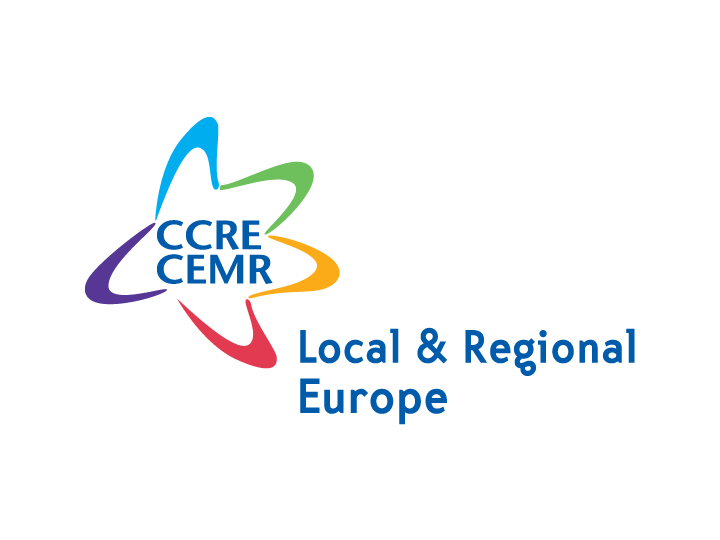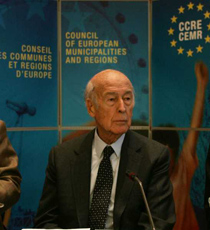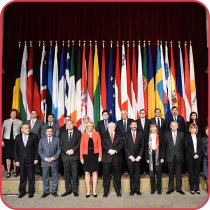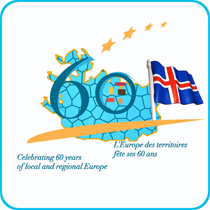Valéry Giscard d’Estaing at CEMR Policy Committee meeting (Maastricht, 13/14 December): When 2/3 of the EU countries will have ratified the Constitution, the pressure will be on those who wouldn’t ratify it
The Maastricht meeting of the Council of European Municipalities and Regions' Policy Committee has opened on 13 December 2004 under the presidency of Valéry Giscard d -Estaing.
The first day of the meeting was devoted mainly to a round table on the European Constitution's achievements and challenges for the local and regional governments.
The achievements of the Convent will come to nothing if the Constitutional Treaty is not ratified, said President Giscard d'Estaing. But there has already been one ratification, by Lithuania, and most probably, Italy and Spain will ratify it too. These ratifications will have a political effect on the other Member States. They will incite others to ratify the Treaty, and this wave of ratifications will isolate those who would not ratify it. When 2/3 of the EU Member States will have ratified the Constitutional Treaty, everybody will look at the countries that would not ratify it. I urge Europe's local and regional governments to do all they can to promote the Constitution and to inform their citizens on it.
President Giscard d'Estaing added that Europe exists, but its citizens don't know it yet, how bizarre! Europe' s citizens still live within national frames that focus on national elections or governments' policies. I often hear that Europe must get closer to its citizens, but these citizens must get closer to Europe too, and this is where local and regional governments can play a role.
The Mayor and Governor of Vienna, Michael Häupl, praised Valéry Giscard d'Estaing for his work as president of the Convention: Thanks to you, the Constitution is a success for local and regional governments, we have got protection and guarantees on several issues that matter to local and regional authorities: public services, subsidiarity, cultural heritage… This compromise text is of great importance for local and regional government. Recognition of citizens needs and their involvement is now guaranteed by the Constitution. The next step is to demonstrate that we can achieve economic growth and social stability as required by the Lisbon strategy, and to make sure our citizens accept the new EU.
The Mayor of Bonn, Bärbel Dieckmann, stated that the Constitution has created an explicit recognition of local and regional government at the European level. Without you, Mr. Giscard d'Estaing, we would not have been so successful. You helped clarify what our role in Europe is. The Constitution is a new beginning for Europe. But there is still a lot to be done : we must work towards a sustainable Europe, meaning that today's decisions must take future needs into account. The European social model is another task head as well as creating a Europe of citizens. Europe will only breathe, it will have a future only if it is accepted by its citizens. Our task in cities and municipalities is to make Europe understood by our citizens. We also need more EU presence in international issues, our municipalities must play a role in this, by getting involved in the millenium goals set up by the United Nations.
Oldrich Vlasak, Member of the European parliament and President of the union of towns and municipalities of the Czech Republic, said that the Constitution is the response to globalisation, it is an attempt to address global challenges. The draft Constitutional Treaty changes the role of the nation-state, it will have a positive impact for local self-government. Good governance must be implemented immediately, without waiting for the EU Constitution to be ratified by all Member States.
The Mayor of The Hague, Wim Daeteman, thanked Valéry Giscard d'Estaing and CEMR for the fact that the role of local and regional government is now recognised by the EU. CEMR has shown how it can influence EU legislation on behalf of local and regional government, this is done by working with the EU Commission and the European Parliament. Now we must turn towards the Council; Europe's local and regional governments can have an influence in the Council by establishing a dialogue with their respective national governments.
The Committee of the Regions of the EU was represented in Maastricht by its former president Jos Chabert, who thanked Valéry Giscard d'Estaing for his work as president of the European Convention : You paid much attention to the needs of our cities and regions, he said.
In other developments, CEMR Policy Committee voted in favour of the adhesion of the Union of Municipalities of Montenegro.
On Tuesday 14 December 2004, the Policy Committee will elect a successor to outgoing president Valéry Giscard d'Estaing. Michael Häupl is the only candidate to CEMR presidency. New vice-presidents will also be elected for a three-year mandate.
Policy Committee members will also adopt CEMR position papers on several issues : public services, local sustainable development, the future of cohesion policy, the 20th anniversary of the European charter of local self-government, town-twinning in tomorrow's Europe.
rn

Climate, Sustainable Finance Officer






